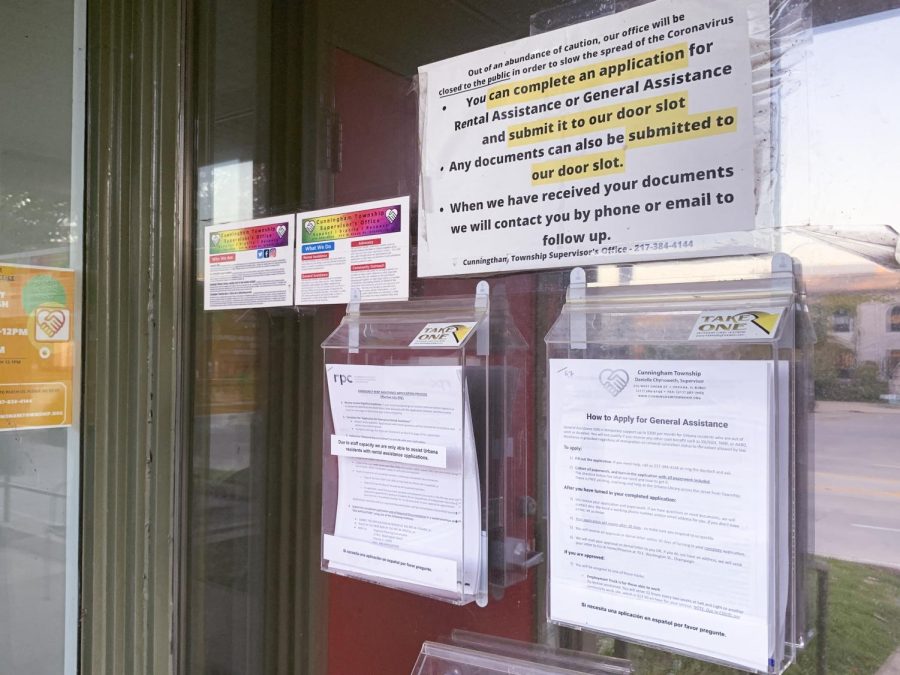Organizations in Champaign County provide emergency rental assistance
Rental assistance forms hang outside of the Cunningham Township Supervisor’s Office. There are multiple organizations in the area trying to help residents with emergency rental assistance since the eviction moratorium ended in Illinois.
Oct 25, 2021
It has been three weeks since the eviction moratorium ended in Illinois, and government agencies and independent organizations in Champaign County are working to provide emergency rental assistance and guidance to residents trying to apply for it.
Cunningham Township in Urbana has been helping residents prepare applications to the Champaign County Regional Planning Commission for rental assistance. Kyle Patterson, housing case manager at Cunningham Township, said he’s seen a large volume of clients recently.
“It’s been kind of large throughout COVID-19,” Patterson said. “But there’s definitely been a noticeable increase over the past month or so.”
The RPC’s Emergency Rent Assistance program planned to distribute funding to between 9,000 and 1,200 households. According to Lisa Benson, RPC’s community services director, the RPC has assisted 1,568 households as of Sept. 30 and continues to receive about 20 applications per day as of Oct. 12, some of which may be from households who were already assisted and are applying for additional assistance.
Patterson said the challenge right now is not receiving funding to distribute but distributing those funds efficiently. He compared the difficulty to supply chain issues caused by COVID-19.
Get The Daily Illini in your inbox!
“And so the issue wasn’t, you know, having the materials or having funding for stuff, it was getting stuff from point A to point B, that was difficult,” Patterson said.
The RPC plans to keep the ERA program open until the current funding is exhausted, Benson said.
Another entity providing rental assistance is the New American Welcome Center at the University YMCA, which primarily serves immigrants.
Jes DeVries, director of immigrant family services at the NAWC, runs an immigrant helpline, which is usually the first point of contact for a client concerned about paying rent or being evicted. The NAWC can provide direct rental assistance or direct the client to another program if it does not have funding at the time.
The client may also be referred to the NAWC’s legal services team, which runs a pro bono legal clinic to mediate with landlords to set up a rent payment plan or delay the eviction process.
DeVries said immigrants were particularly hit hard by COVID-19.
“Basically everyone I talked to has been impacted by COVID in some way, whether they’re just working fewer hours, or they lost a job at some point. So I very, very rarely find anyone who’s having trouble paying their rent who hasn’t been impacted by COVID,” DeVries said.
In order to apply for rental assistance, residents must provide proof of 60 days of income or a W-2 from 2020, a lease and a rental ledger. DeVries said she encounters many clients who do not have a signed lease with their landlords.
Erika Vergara, legal services coordinator at NAWC, also holds informational workshops about evictions.
“Basically what we’re trying to educate the community is that someone cannot just intimidate you or threaten you with deportation or threaten you with making you homeless by calling the police, that there is a system in place that needs to be followed,” Vergara said.
Patterson echoed this idea. He said he explains to clients four or five times a day that an eviction notice does not mean they must move out within five days.
A five-day notice means that if the tenant does not pay a balance to their landlord within five days, the landlord will then file for an eviction in court.
“The only person that can make somebody leave their residence is a sheriff’s deputy with a judge’s order after there’s been a trial held for an eviction,” Patterson said.
While Cunningham Township can only serve Urbana residents, Champaign residents seeking assistance are directed to the City of Champaign Township. Champaign County residents can also apply directly to the RPC, and the nonprofit organization Bridgewater Sullivan Community Life Center provides assistance to both tenants and property owners who are Illinois residents and who cannot pay their rent because of COVID-19.
There were nearly 5,000 households behind on rent and possibly at risk of eviction in Champaign County as of Aug. 16, according to Surgo Ventures, a nonprofit organization that collects data about health and social problems.
The NAWC has been receiving inquiries related to rental assistance since March 2020.
“It’s hard to always be talking to our clients who still are without enough work and are concerned about getting rent and food and utilities paid,” DeVries said. “So I think that’s more so the part that’s making it feel a little hard, it’s just that it’s very persistent.”






